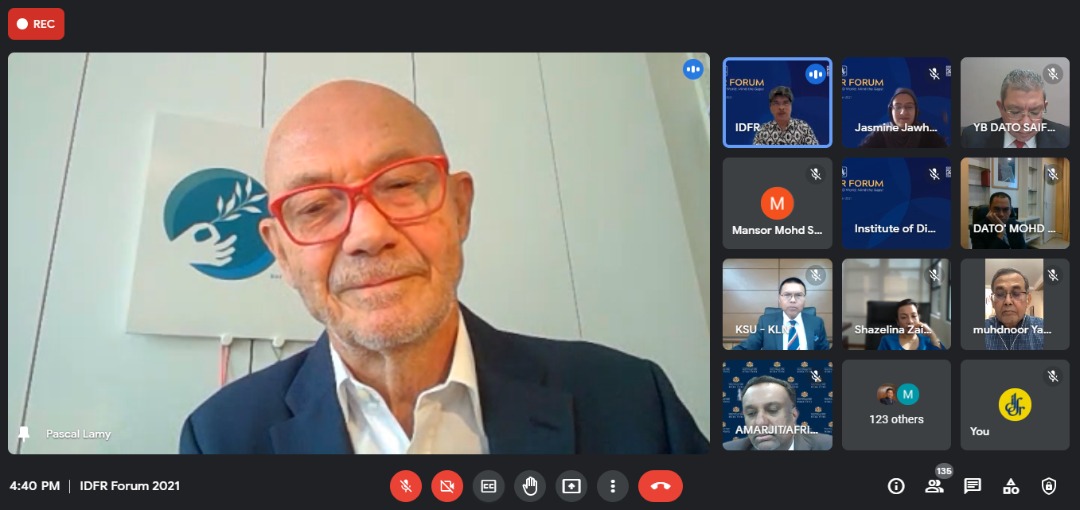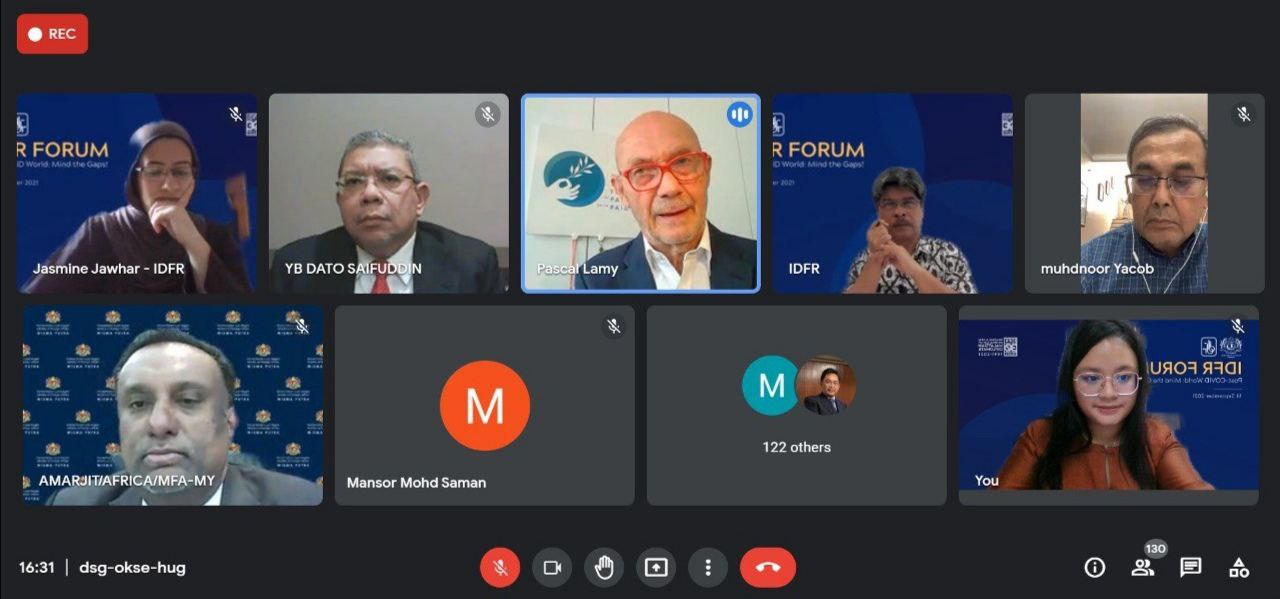
Celebrating its 30th anniversary, the Institute of Diplomacy and Foreign Relations (IDFR) had successfully organised a forum titled, Post-COVID World: Mind the Gaps! on 14 September 2021. The Forum featured the renowned Mr. Pascal Lamy, President Emeritus, Jacques Delors Institute and Former Director General of the World Trade Organization (WTO) as the guest speaker and Professor Dr. Sufian Jusoh, IDFR’s Distinguished Fellow and the Director of the Institute of Malaysian and International Studies (IKMAS) as the moderator. The Forum was also graced by YB Dato’ Saifuddin Abdullah, Malaysia’s Foreign Minister, who delivered the welcoming remarks. 140 participants from various embassies and high commissions, as well as officials from relevant ministries, government agencies, think tanks and universities attended the Forum virtually via Google Meet.
In his welcoming remarks, the Foreign Minister congratulated IDFR for its sterling 30 years as the Ministry of Foreign Affairs’ training arm. Given the current state of the global pandemic, YB Dato’ Saifuddin emphasised on health diplomacy as the current focus of MFA. This is not only on vaccine matters but also the gap issues of the “Haves” and “Have-nots” in the vaccine distributions. The emergence of a new diplomatic framework has also become apparent with the pertinent role of the World Health Organisation (WHO) as well the vaccine-producing corporations and countries. Health diplomacy is also deemed essential to address the context of politics and economics in public health, equipment, facilities, science and data, among others, towards the course of post-COVID era.
Mr. Lamy took the floor from Professor Dr. Sufian by thanking the guests and organisers as he was honoured to join the Forum albeit virtually. He began by stating that the world has undergone unprecedented changes whereby there is a large discrepancy between the number of global challenges and the capacity of governments as well as international institutions to provide the necessary cooperation. Consequently, the post-COVID world will be more complex than it has already been prior to the pandemic.
Towards the post-COVID era, Mr. Lamy highlighted three major gaps that need to be kept in mind namely between the “North and South”, the “East and West'' and the “Haves and Have-Nots”. For the first point, he opined that the pandemic will create a “North-South” asymmetric economic and health shock, as the developed countries are able to stabilise and recover better from the economic consequences compared to the less developed countries. Despite facing the same vulnerability to the virus, the reaction of the health system and the vaccine distributions have been incredibly inequitable. On the second point, Mr. Lamy emphasised that the new “Cold War” of the United States (U.S.)-China rivalry will persist in the next decades whereby both the “East and West” sides regard each other as threats. It will raise significant international challenges not only in geopolitics but also in geoeconomics to the non-US and non-China entities such as the European Union (EU) and the Association of Southeast Asian Nations (ASEAN). For the third point, the divide of the “Haves and Have-Nots” refers to the inequality within and between countries whereby some of them are impacted by COVID-19 more dramatically than others, which will likely generate social discontent, social unrest and political disruptions hence making international cooperation more difficult.
Mr. Lamy concluded the Forum by highlighting that the world will not be de-globalised, but instead it will be globalised differently with the changes to the balance between geopolitics and geoeconomics. He added that international cooperation has to be diversified where various stakeholders such as the multinational corporations, non-governmental organisations, academic institutions and non-state actors have to shoulder bigger roles in addressing these global challenges. While this will make the diplomats’ responsibilities more difficult, the multi-stakeholders’ coalition will lead to more impactful results in addressing global challenges beyond the capacity of the sovereign states.



Prepared by:
Ms. Hanun Insyirah Ishak and Ms. Aida Yasmin Azhar
Centre for Political Studies and Economic Diplomacy (PSED)



